#saving bees
Explore tagged Tumblr posts
Text
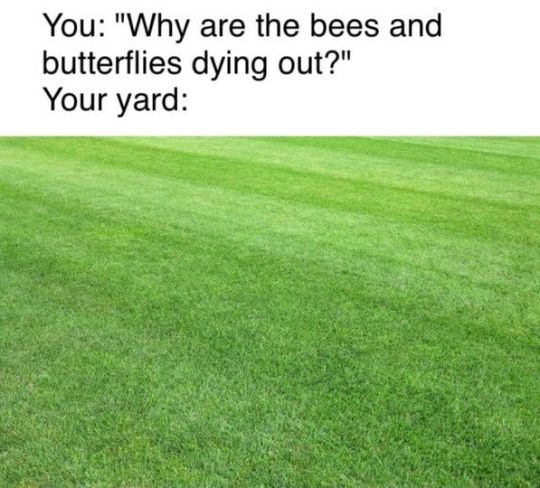
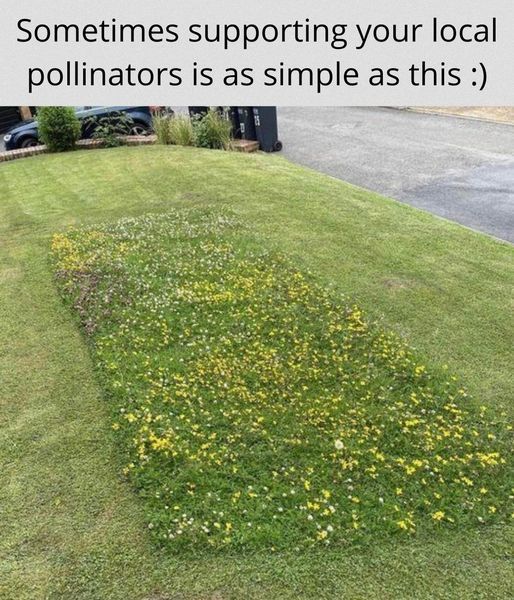
321 notes
·
View notes
Text
"A Scottish field once home to mono-crop barley has become a pollinator’s paradise after intervention from a local trust saw bumblebee numbers increase 100-fold.
Entitled Rewilding Denmarkfield, and run by the Bumblebee Conservation Trust, the project has also seen a sharp increase in the number of species passing through the rolling meadows after they were reclaimed by dozens of wildflower species.
The area north of Perth is about 90 acres in size, and surveys of bumblebees before the project began rarely recorded more than 50. But by 2023, just two years of letting “nature take the lead” that number has topped 4,000, with the number of different bee species doubling.
“This superb variety of plants attracts thousands of pollinators. Many of these plants, such as spear thistle and smooth hawk’s beard, are sometimes branded as ‘weeds’. But they are all native species that are benefiting native wildlife in different ways,” Ecologist Ellie Corsie, who has been managing the project since it began in 2021, said.
“Due to intensive arable farming, with decades of plowing, herbicide, and pesticide use, biodiversity was incredibly low when we started. Wildlife had largely been sanitized from the fields. Rewilding the site has had a remarkable benefit.”
Similar increases have been recorded in the populations of butterflies, with a tripling in the number of these insects seen on average during a ramble through the field.
The numbers of both insects are now so high that Rewilding Denmarkfield offers bee and butterfly safaris to visitors.
Local residents told the Scotsman that on spring and summer days, the field is awash with color, and hums with the sounds of bees and birds. Even as multiple housing developments expand around the Denmarkfield area, the field is a haven for wildlife."
-via Good News Network, December 2, 2024
#bees#bumblebee#save the bees#pollinators#conservation#sustainability#hope posting#insects#entomology#rewilding#scotland#europe#good news#hope
9K notes
·
View notes
Text


Wings sourced from beekeepers dealing with the loss of their hives due to extreme weather, the pieces are made to memorialize the bees.
"A veil lifts between two worlds: light and dark; life and death; individual and union. It is worn in ceremony of transition. It is a fabric of both grief and celebration, made up of a community, a hive." by lucijockel
12K notes
·
View notes
Text
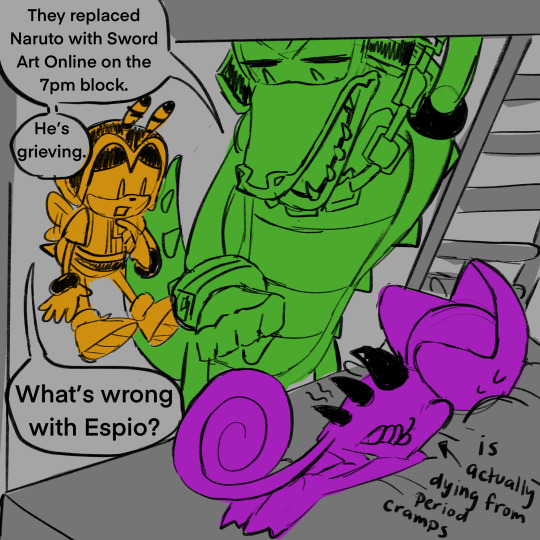
i’m suffering so espio has to suffer too
#espio the chameleon#vector the crocodile#charmy bee#team chaotix#sonic heroes#sonic the hedgehog#sonic#sega#sonic fanart#sonic the hedghog fanart#shitpost#please save me i’m in so much pain
1K notes
·
View notes
Text





Bumblebee/humla. Värmland, Sweden (May 17, 2020).
3K notes
·
View notes
Text

THE BRAWN 🏏
#dead boy detectives#charles rowland#dead boy detective fanart#Edwin is the brain Charles is the Brawn and I’m the struggling artist#please look at the jar of bees I love them#save dead boy detectives
2K notes
·
View notes
Text
Grief





B-127
Brother
Friend
Warrior
It's not exactly how it happens but Someone asked about Optimus being the one to acidentaly kill Bee so.......
yeah...
the last image IS a scene that happens tho :D
#transformers one#digital art#deceptibee au#b 127#bumblebee#art#maccadam#optimus prime#secondbee au#yes optimus did beg the matrix to save Bee#matrix went NOPE#Look at bee- he gets greyer every panel#some of my best work#lets be honnest#angst#we love it#comic
2K notes
·
View notes
Text
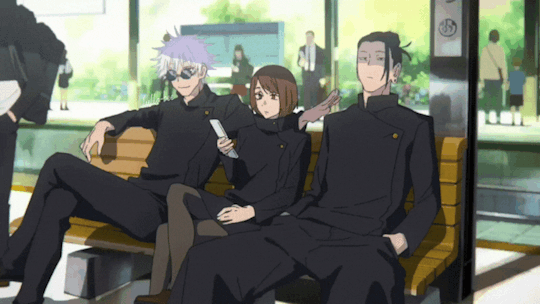
let's pretend that this is the most violent they have ever become
#it's ok to save but not reposting or using without credits please#dunno abt u but hidden inventory arc ended at 2 and a half episodes for me#jujutsu kaisen#jjk#jjk season 2#jjk s2#jjk gif#jjk edit#geto suguru#gojo satoru#ieiri shoko#sashisu#satosugu#lulla-bee#lulla-bee edits#episode 5 what?#*breaking down*
20K notes
·
View notes
Text
Though there can be many negative impacts of honeybees on the landscape in North America: honeybees are not going anywhere and beekeepers are some of the most powerful allies in the fight against insecticides and herbicides. Right now we NEED honeybees to pollinate our crops. Eventually we should move towards requiring native hedgerows to reduce our reliance on honeybee shipments...not only will this be cheaper for farmers in the future, it will help reduce the amount of insect diseases that are spread by honeybees. (As the bees are shipped all over the continent) However, honey is always going to be something people want. The important thing for beekeepers to keep in mind, is making sure there are not too many hives per square mile! A single hive is 15,000-50,000 additional mouths to feed in an area that may already have limited pollen resources for native bees. (Who are often solitary) Responsible bee keepers can improve the impact their hives have by learning how many hives are in an area, planting abundant native flower resources on whatever land they manage, and taking feral hives out of the ecosystem rather than propagate new hives from scratch, or buying queens from retailers. People who keep honeybees are not bad people for loving honeybees! Honeybees are fascinating animals and often act as ambassadors to the beauty of the insect world. There are many ways we can and do work together to mitigate harm on all insects!
2K notes
·
View notes
Text
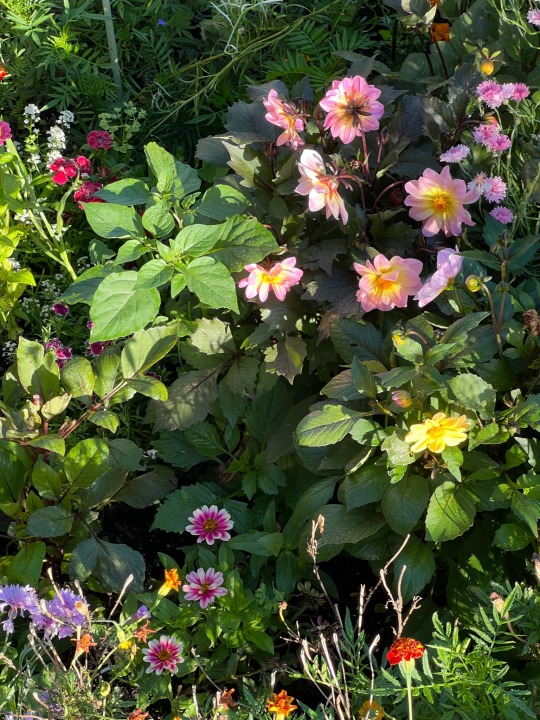
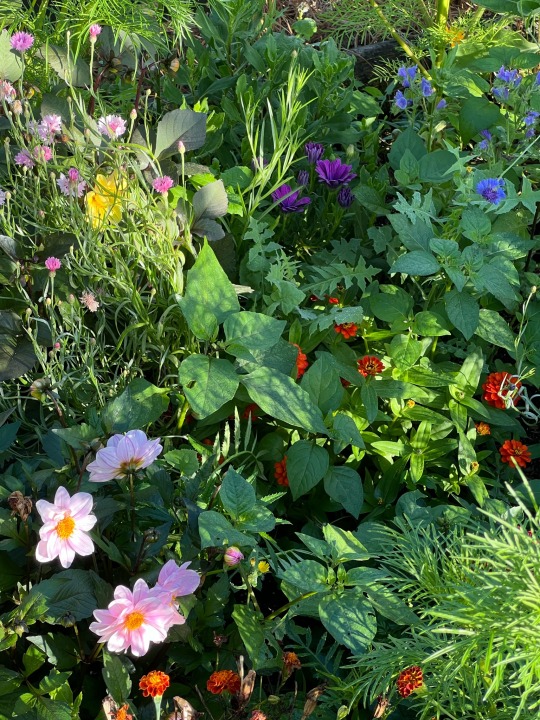
My garden
#my garden#dahlia#cornflower blue#cottage garden#wildflowers#colour#gardencore#cottagecore#naturecore#flowers#bees#save the bees#fairycore#gardening#cottage aesthetic#flower aesthetic#aesthetic#flowercore
4K notes
·
View notes
Photo

225 notes
·
View notes
Text
"In 2021, scientists in Guelph, Ontario set out to accomplish something that had never been done before: open a lab specifically designed for raising bumble bees in captivity.
Now, three years later, the scientists at the Bumble Bee Conservation Lab are celebrating a huge milestone. Over the course of 2024, they successfully pulled off what was once deemed impossible and raised a generation of yellow-banded bumble bees.
The Bumble Bee Conservation Lab, which operates under the nonprofit Wildlife Preservation Canada, is the culmination of a decade-long mission to save the bee species, which is listed as endangered under the Xerces Society for Invertebrate Conservation...
Although the efforts have been in motion for over a decade, the lab itself is a recent development that has rapidly accelerated conservation efforts.
For bee scientists, the urgency was necessary.
“We could see the major declines happening rapidly in Canada’s native bumble bees and knew we had to act, not just talk about the problem, but do something practical and immediate,” Woolaver said.
Yellow-banded bumble bees, which live in southern Canada and across a huge swatch of the United States, were once a common species.

However, like many other bee species, their populations declined sharply in the mid-1990s from a litany of threats, including pathogens, pesticides, and dramatic habitat loss.
Since the turn of the century, scientists have plunged in to give bees a helping hand. But it was only in the last decade that Woolaver and his team “identified a major gap” in bumble bee conservation and set out to solve it.
“No one knew how to breed threatened species in captivity,” he explained. “This is critically important if assurance populations are needed to keep a species from going extinct and to assist with future reintroductions.”
To start their experiment, scientists hand-selected wild queen bees throughout Ontario and brought them to the temperature-controlled lab, where they were “treated like queens” and fed tiny balls of nectar and pollen.
Then, with the help of Ontario’s African Lion Safari theme park, the queens were brought out to small, outdoor enclosures and paired with other bees with the hope that mating would occur.
For some pairs, they had to play around with different environments to “set the mood,” swapping out spacious flight cages for cozier colony boxes.
And it worked.
“The two biggest success stories of 2024 were that we successfully bred our focal species, yellow-banded bumble bees, through their entire lifecycle for the first time,” Woolaver said.
“[And] the first successful overwintering of yellow-banded bumble bees last winter allowed us to establish our first lab generation, doubling our mating successes and significantly increasing the number of young queens for overwintering to wake early spring and start their own colonies for future generations and future reintroductions.”
Although the first-of-its-kind experiment required careful planning, consideration, resources, and a decade of research, Woolaver hopes that their efforts inspire others to help bees in backyards across North America.
“Be aware that our native bumble bees really are in serious decline,” Woolaver noted, “so when cottagers see bumble bees pollinating plants in their gardens, they really are seeing something special.”"
-via GoodGoodGood, December 9, 2024
#bees#insect#save the bees#xerces society#biodiversity#conservation#endangered species#wildlife conservation#canada#north america#climate action#climate news#good news#hope
6K notes
·
View notes
Text




554 notes
·
View notes
Text

#if i speak…#ambessa save me. save me ambessa.#ambessa medarda#arcane ambessa#ambessa x reader#bee#maneskinwh0re#lesbian#sevika#sevika arcane#arcane sevika#arcane#arcane season 2#arcane spoilers#arcane s2#ambessa league of legends
1K notes
·
View notes
Text
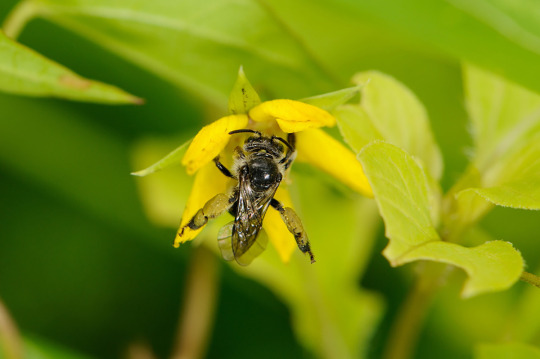
Xerces Society: Announcing The State Of The Bees Initiative: Our Plan To Study Every Wild Bee Species In The U.S.
This is really exciting news! For those unaware, the Xerces Society has been focusing on invertebrate conservation for over fifty years, and has pioneered a lot of the work to bring awareness to the devastating losses of not only insects but other terrestrial and aquatic invertebrates. It gets its name from the Xerces blue butterfly (Glaucopsyche xerces), the first North American butterfly driven to extinction by human activities.
Even if you haven't heard of the Xerces Society, you've probably come across various "Save the Bees!" campaigns. These frequently focus on the domesticated European honey bee (Apis mellifera), which, while it may be important to crop pollination in many parts of the world, is not a part of natural ecosystems in places like the Americas and Australia, and can be considered an invasive species at times. With the rise of colony collapse disorder (CCD) particularly after the turn of the 21st century, where entire domestic honeybee colonies would die off, the need to preserve bees began to gain wider public acknowledgement.
But what many people don't realize is that it is the thousands upon thousands of other native bee species worldwide that are in greater danger of extinction. They don't have armies of beekeepers giving them safe places to live and treating them for diseases and parasites. More importantly, where honey bees may visit a wide variety of plants, native bees often have a much narrower series of species they visit, and they are quite vulnerable to habitat loss. Most bees are not as social as honey bees and live solitary lives, unseen by the casual observer.
Invertebrates in general often suffer from a lack of conservation information, meaning that particularly vulnerable species may fly under the radar and risk going extinct without anyone realizing until it's too late. This ambitious program by the Xerces Society aims to solve that problem, at least for the 3,600+ species of bee in the United States. If they can assign a conservation status to each one, then that strengthens the argument toward protecting their wild habitats and working to increase their numbers. Hopefully it will also prompt more attention to other under-studied species that are in danger of going extinct simply because we don't know enough about them.
#bees#save the bees#invertebrates#arthropods#insects#entomology#nature#wildlife#animals#ecology#environment#conservation#science#scicomm#endangered species#extinction#pollinators#Xerces Society#Xerces blue
598 notes
·
View notes
Text

(it's blurry but if you click it's better quality)
i wanted to draw some favorite ships! and also say that if you like any of these shows, you WILL find something to love about dead boy detectives ❤️
(they're in the middle)
give it a watch and rec it to friends! netflix cancelled it and i think it would be very funny to see it chart again.
🩷❤️🧡💛💚🩵💙💜
(ko-fi)
#i hope you like it!!#dead boy detectives#our flag means death#good omens#the owl house#the adventure zone#heartstopper#taz balance#scooby doo#steven universe#star trek#blackbonnet#spirk#lumity#rupphire#taakitz#ineffable husbands#aziracrow#bee scribbles#ink and color#yes i make my kirk and aziraphale black because i wanna#save dead boy detectives
732 notes
·
View notes